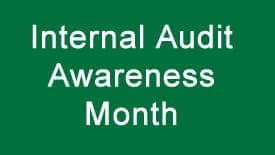Roles and responsibilities of the Internal Audit Department

There are many misconceptions about the job of an internal auditor. A well-known one is that auditors go to a department, disrupt everyone’s lives, point out everything that is done “wrong” and walk away. Internal auditors do so much more than audit and investigate. They also:
- Offer insight and advice – auditors’ knowledge of controls and broad perspective of the organization make them great consultants for many projects. While it remains management’s responsibility for an area’s processes, internal auditors can provide guidance on risks and controls
- Evaluate risks – in addition to the annual risk assessment conducted by Compliance, RMSS and Internal Audit annually, internal auditors can come to a department and help assess risks and determine how effectively they are managed
- Assess controls – internal auditors can help evaluate the efficiency and effectiveness of controls
- Improve operations – Internal audit can look at the operations in a department and compare them with the organization’s objectives. Internal audit can help determine if unit operations are effective and efficient
- Promote ethics – Internal auditors abide by a Code of Ethics that upholds the principles of integrity, objectivity, confidentiality and competency, and UNC Charlotte’s Internal Audit Department promotes these principles in all of its projects
The Internal Audit Department can provide objective, professional advice to all levels of management and assist the University in continuously improving the efficiency and effectiveness of operations.
May is Internal Audit Awareness Month, and each week during this observance the Internal Audit Department is providing a short article to assist the campus to become better informed about internal audit.